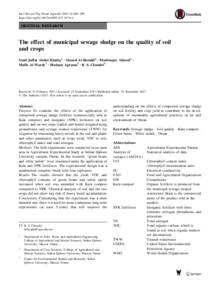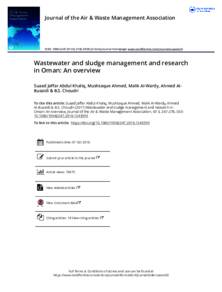وثيقة
The effect of municipal sewage sludge on the quality of soil and crops.
المعرف
DOI: 10.1007/s40093-017-0176-4
المصدر
International Journal of Recycling of Organic Waste in Agriculture. v. 6, 4, p. 289-299
المساهمون
Al-Busaidi, Ahmed., مؤلف
Ahmed, Mushtaque., مؤلف
Al-Wardy, Malik., مؤلف
Agrama, Hesham., مؤلف
Choudri, B. S. , مؤلف
الدولة
Germany.
مكان النشر
Berlin
الناشر
Springer Berlin Heidelberg.
ميلادي
2017-12-01
اللغة
الأنجليزية
الملخص الإنجليزي
Purpose: To examine the effects of the application of composted sewage sludge fertilizer (commercially sold as Kala compost) and inorganic (NPK) fertilizers on soil quality and on two crops (radish and beans) irrigated using groundwater and sewage treated wastewater (TWW) for irrigation by measuring heavy metals in the soil and plants and other parameters such as crops yield, TOC in soil, chlorophyll index and total nitrogen. Methods: The field experiments were conducted in an open area in Agricultural Experimental Study at Sultan Qaboos University campus, Oman. In this research, “green beans and white radish” were examined under the application of Kala and NPK fertilizers. The experimental design was a randomized complete block with four replicates. Results: The results showed that the yield, TOC and chlorophyll contents of green beans and white radish increased when soil was amended with Kala compost compared to NPK. Chemical analysis of soil and the two crops did not show any risk of heavy metal accumulation. Conclusions: Considering that the experiment was a short duration one, there is a need for more continuous long-term experiments (at least 5 years) that will improve the understanding on the effects of composted sewage sludge on soil fertility and crop yield to contribute to the development of sustainable agricultural practices in an arid environment of Oman.
ISSN
2195-3228
قالب العنصر
مقالات الدوريات


